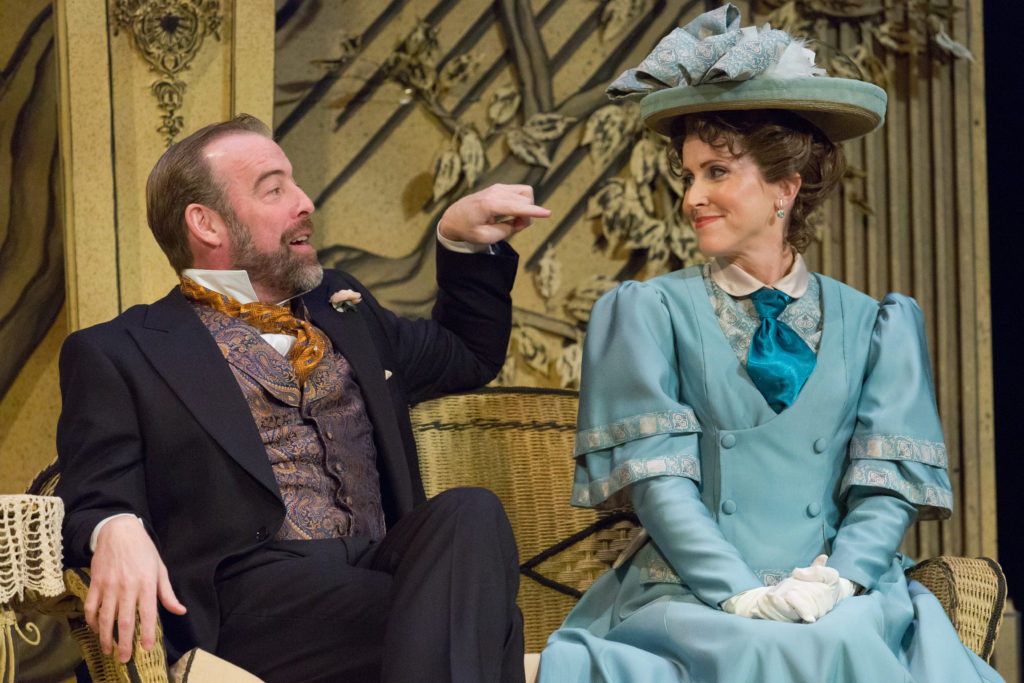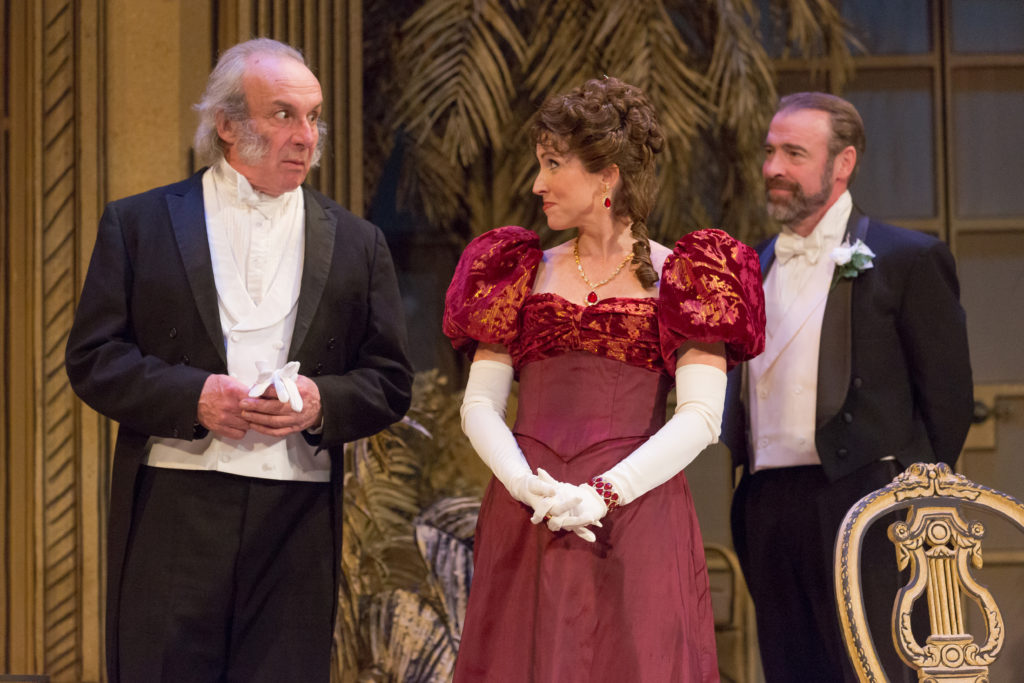In this interview with Bernard Havard, Walnut Street Theatre’s President & Producing Artistic Director as well as director of Oscar Wilde’s A Woman of No Importance, he describes his work casting and directing the actors and many other aspects of creating an artistically successful production.
For more details check out our first interview in a series of three: “Risks can lead to financial loss: Interview with Bernard Havard on A Woman of No Importance at the Walnut Street Theatre,” and the third interview, “What’s going on behind the scenes?: Interview with Bernard Havard on working with his creative team at the Walnut Street Theatre”

Henrik Eger: Most people seem to know you only as one of the most successful theater directors for miles. Could you give a few examples of how your childhood and adolescent experiences led you to the theater world?
Bernard Havard: Born in Chiswick, England, I was a child actor at St. George’s, a Catholic boys’ boarding school in Surrey. As I had a very high soprano, I got to play all the female roles.
In adolescence, I was involved in a television program in Calgary, Alberta, as an actor. It was called More or Less, and it was also sold to ABC in Australia. I played a juvenile delinquent in a black leather jacket and a ducktail hairstyle.
Henrik: Audiences often wonder whether you are English or Canadian.
Bernard: I’m a proud American. I was born in England and immigrated to Calgary, Alberta, Canada with my family when I was eleven years old. In 1977, I was head-hunted into the Alliance Theater in Atlanta, GA.
Henrik: Did those experiences encourage you later in life to create programming for young people in Philadelphia?
Bernard: No, that came much later. I got involved in touring for young children in Toronto with Young People’s Theatre. Later on, I was recruited by the Citadel Theatre in Edmonton, Alberta, putting together tours for young audiences in Northern Alberta. We would fly our company into Northern Alberta, because those communities were so remote that this was the best way to reach them. This program was subsidized by the Alberta government.
Henrik: You seem to have quite a theater background via your family.
Bernard: During my childhood, I found out that my family has been in the theater for over 200 years. They were an Irish acting family who had moved from Dublin to England in the 1820s. One of my great-great aunts was the first woman to play Candida for George Bernard Shaw and the first woman to smoke a cigarette onstage at Wyndham’s Theatre in London.
There were two aunts. One was called Kate Rorke and the other Mary Rorke. The family had Anglicized their names when they moved from Ireland to get along better with the British. They both ended up teaching a whole generation of actors at the Royal Central School of Speech and Drama and at the Guildhall School of Music and Drama, two famous theater schools in London.
Henrik: Even the most experienced actors consider it a great honor to be cast by you. Could you tell us more about that process?
Bernard: If there’s one strength that I have, Henrik, it’s in my casting. I’ve been casting actors now for over 55 years, and I think I have a very good understanding for what talent and truth is about—in terms of conveying that from one human to another, meaning the artist at one end and the audience at the other.
I don’t have a problem with it. It’s something that’s come to me over the years, and I feel natural and confident about that aspect of my work.
Henrik: Has it ever happened that an actor whom you had screened and hired did not pull through and you had to let go of that person?
Bernard: It has happened to me as a producer, but not as a director. All of those actors that you saw onstage in A Woman of No Importance, none of them auditioned for me, except Audrey [Ward as Miss Hester Worsley]. I’ve worked in this city for 37 years. I know many of the best actors in the city. I knew exactly who I wanted, and I offered them the roles.
However, as a producer, there was a very unfortunate incident years ago. A wonderful older actress had been hired, and it turned out that her memory was totally shot. She was not able to retain the lines, and I, unfortunately, had to part company with her, and it was one of the most emotionally painful experiences of my life.
But now, we actually have the technology to put a hearing aid into an actor’s ear and have the stage manager prompt them through the hearing aid, so, from a memory standpoint, with that technology we’re able to preserve an actor’s longevity.
Henrik: You brought together great actors who have won many Barrymores and other awards or nominations, including Mary Martello (as Lady Caroline Pontefract), Paul L. Nolan (as Mr. Kelvil), Karen Peakes (as Mrs. Allonby), Jane Ridley (as Lady Hunstanton), Jessica Bedford (as Lady Stutfield), Peter Schmitz (as Archdeacon Daubeny), and Bill van Horn (as Sir John Pontefract). What were you looking for in this cast?
Bernard: The whole cast was a joy to work with. I hired people who, I think, have tremendous instincts and great talent. I was looking for a specific physical type, but also an actor who could handle the language well and was appropriately-aged.
Oscar has given us those characters, Dr. Daubeny, for instance. If you read Oscar’s letters—there are 641 of them, I believe—he uses Daubeny as a running joke in all of his letters. When anybody complains about all their ailments in old age, he calls them “Daubenys.”
Peter Schmitz, to me, is the perfect model for Daubeny. He fits those roles that Wilde has written. He understands these people, and he nails them.
Similarly, there’s Mr. Kelvil, the pompous Member of Parliament. When you think of an actor locally who can do pompous really well, Paul Nolan is exceptional at it. He’s played more military men and men of authority than I remember anybody else doing around here.
Don’t forget, there’s another wonderful actor that we’re overlooking because he doesn’t have many lines in this play, but what he has, he makes the most of, and that’s Bill Van Horn. He played Sir John Pontefract, Lady Caroline Pontefract’s hen-pecked husband.

Henrik: Women of the ruling class during Wilde’s time dominate this play. Tell us about those women.
Bernard: Mary Martello played Lady Bracknell in Wilde’s Importance of Being Earnest, so she’s more than earned her spurs in this sort of environment, and so has Jane Ridley. They’re all exceptional.
The only one that I’d never seen do classical work was Jessica Bedford, but I’d seen her do And Then There Were None, so she’d worked with us before, and she handles the English accent very well.
They’re all world class actors. I believe they could take the stage anywhere, in New York, London, and would be among the best.
Henrik: Is there any particular approach you prefer in giving feedback to your actors?
Bernard: Yes. The director I admired most that I worked with over the years was Malcolm Black. He directed numerous shows at the Walnut, and his method of giving notes was individual. He would not give notes to the entire company. He would never run the risk of offending somebody in front of the rest of the company, so I used the same methodology. I thought it worked wonderfully well.
If there was a note I would give anyone, I would take them aside and give them the note, either during the rehearsal when we would have a break or after a preview. They were all personal, never a collective one other than to say, “Bravo, you did a wonderful show tonight.”
Henrik: Often, Oscar Wilde gets portrayed as a caricature—a talented, narcissistic, rich dandy—giving people who don’t appreciate his wit a chance to cut him down.
Your production did the opposite: as Lord Illingworth, a dubious, almost Weinsteinean character who wanted to right one of the wrongs in his life, Ian Merrill Peakes moves and even sits down with a wide range of elegant Wildean motions and gestures, each one presenting another kaleidoscopic aspect of Wilde at the height of his social and literary fame.
How did you get Peakes to turn each moment into a unique vignette, as if Oscar Wilde himself had arrived on the Walnut stage?
Bernard: Ian brings that strength to his creativity as an actor. He grew up in a theatrical family. His father John worked for us as an actor at the Walnut, and also a director, so Ian is imbued with the same blood of the theater. Ian’s really cut from a classical model, able to extend his talents over a considerable range. He’s done a lot of Shakespearean roles. Just recently, he played Salieri at the Folger Theatre and was lauded for that performance in Washington, D.C.
Not many notes for Ian from me.
Henrik: What did you do to make sure that the American in England didn’t sound like everyone else?
Bernard: I didn’t want people thinking, “Where she is from?” One of the characters refers to having met one of her relatives in Boston, but I didn’t want to lay that dialect on her. Audrey had a nice American accent that was devoid of any regional flavor, and I thought that was appropriate.
Henrik: What was it like directing your own son, the multi-talented Brandon O’Rourke—playing the young Gerald Arbuthnot, in love with the visiting American woman?
Bernard: He was asked by a director that has known Brandon all of his life, who was here for his 21st birthday last week, what it was like to be directed by his father, and Brandon said it was different than any other director he had worked with.
Henrik: What was different in your communication as a director with your son?
Bernard: In Brandon’s case, because he lives under the same roof as me, it was very easy to talk to him.
Henrik: Not all actors always agree. How do you handle their suggestions, especially if some of them come from your son?
Bernard: An actor sometimes will say, “I don’t agree with you,” and I will say, “Well, why don’t we try it and see who’s right?” And sometimes they’re right, and sometimes I’m right. I like to be objective about the situation and see if it works in terms of the audience. When we try something, it’s really in front of an audience. That’s why we’re so fortunate to have nine previews, so those things can be worked out, and we can hear what the response is from the audience.
Henrik: Could you give an example?
Bernard: Sure, did the laugh work, or did it land properly? Sometimes I might say, “Don’t you have to wait another pause—give it a Pinter pause to let it land, so you don’t jump on the next guy’s line.” It was easy. In fact, it was very easy.
Working with Brandon was one of the most enjoyable experiences of my life.
[Walnut Street Theatre, 825 Walnut Street] January 14-March 1, 2020; walnutstreettheatre.org
